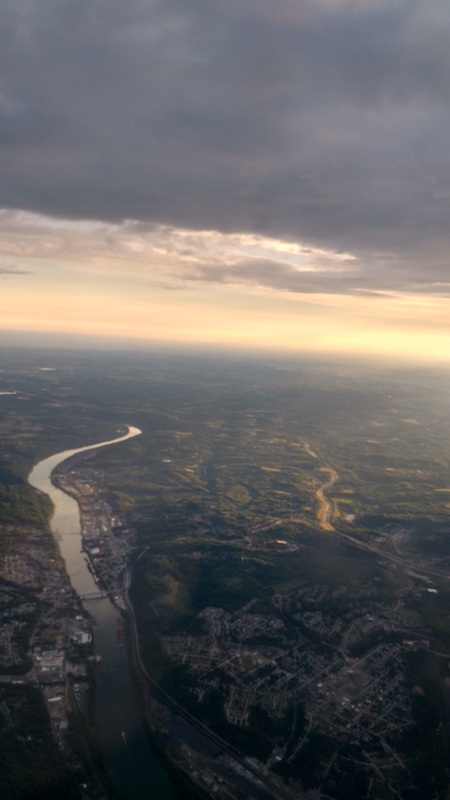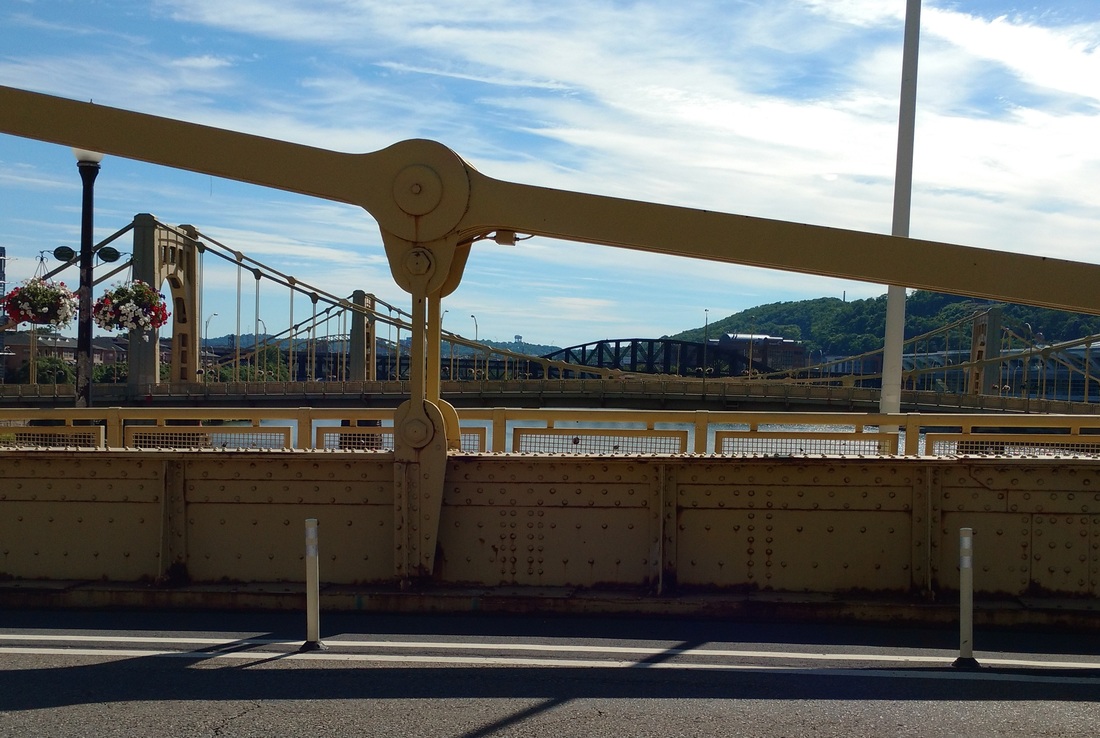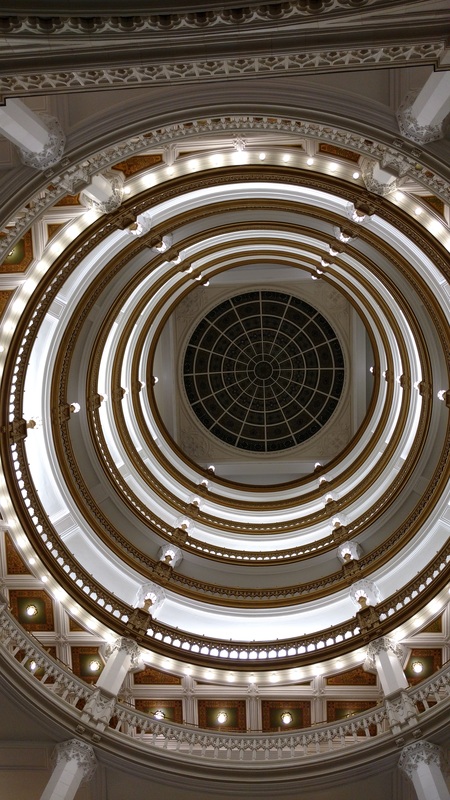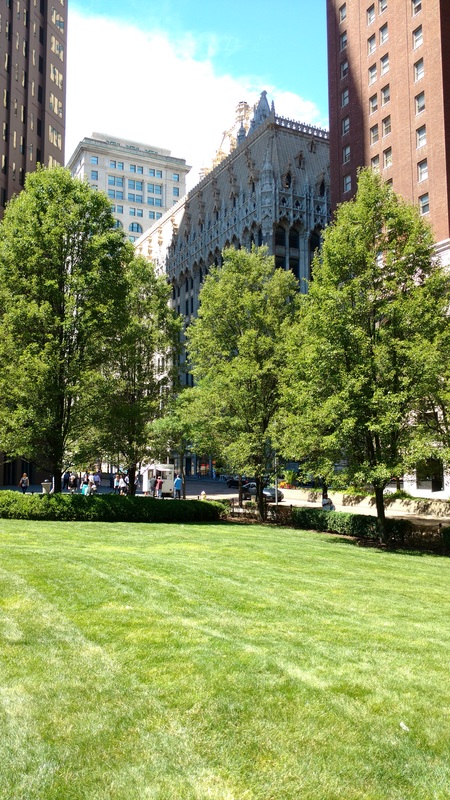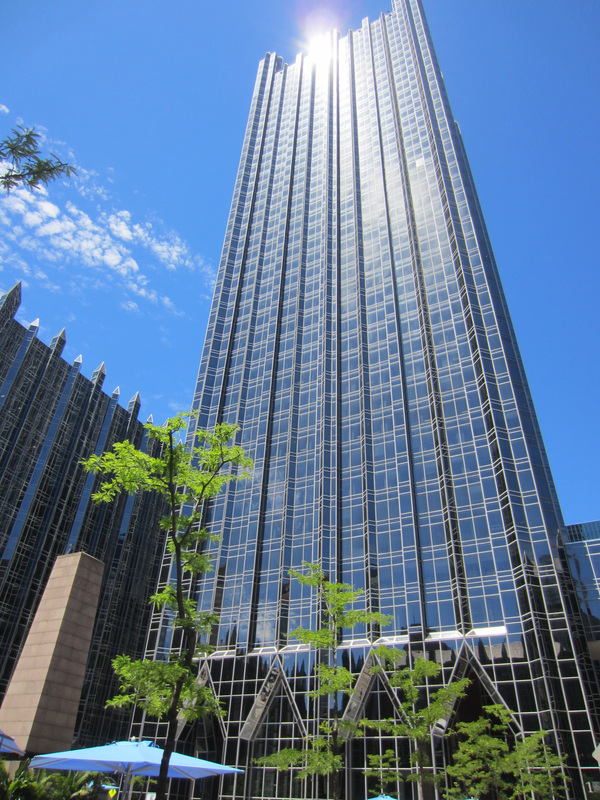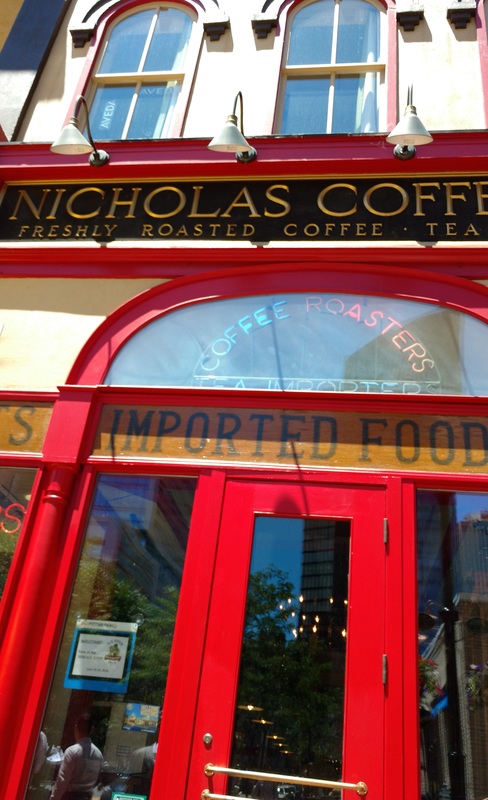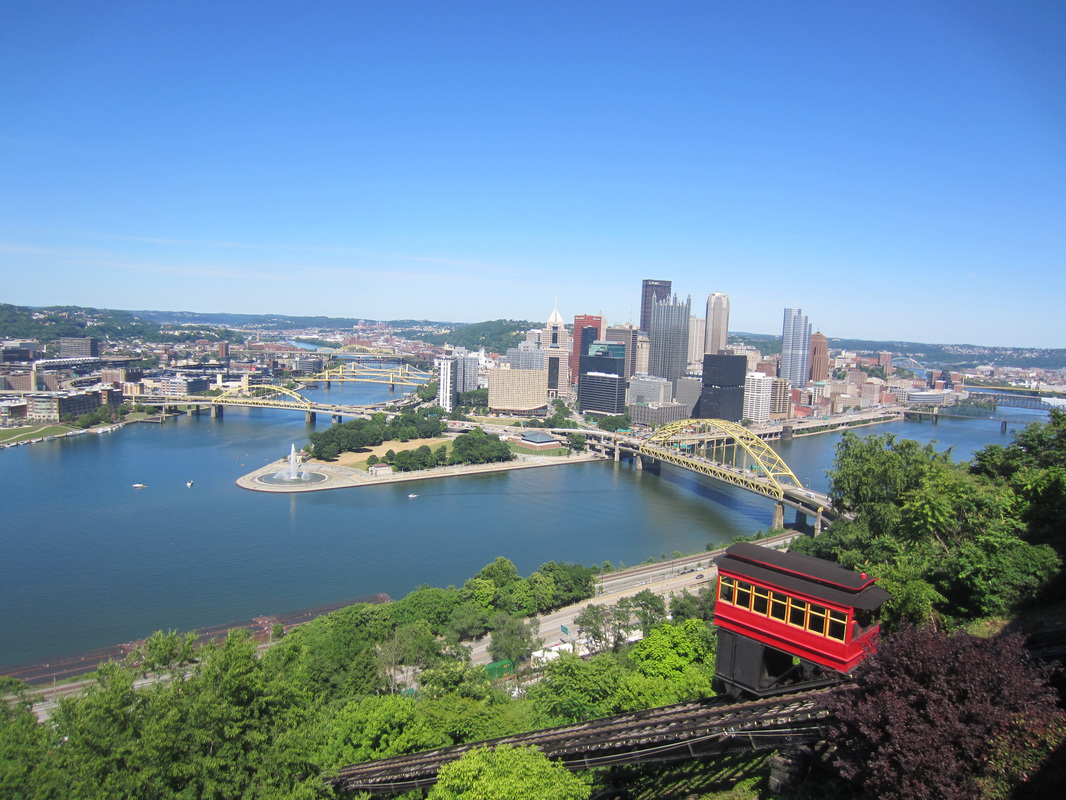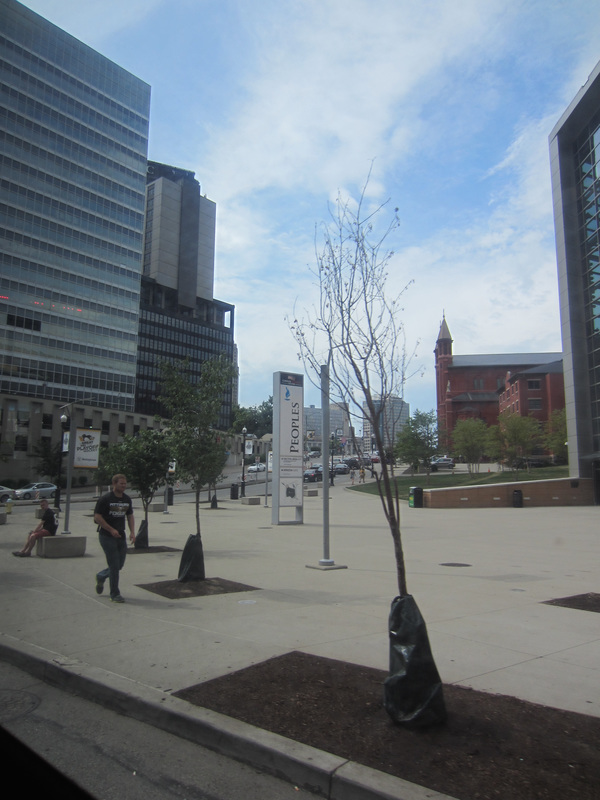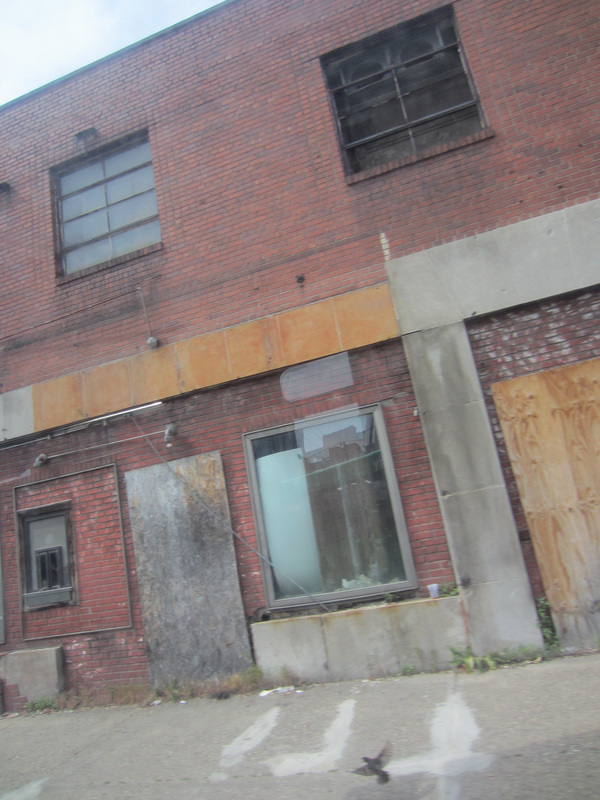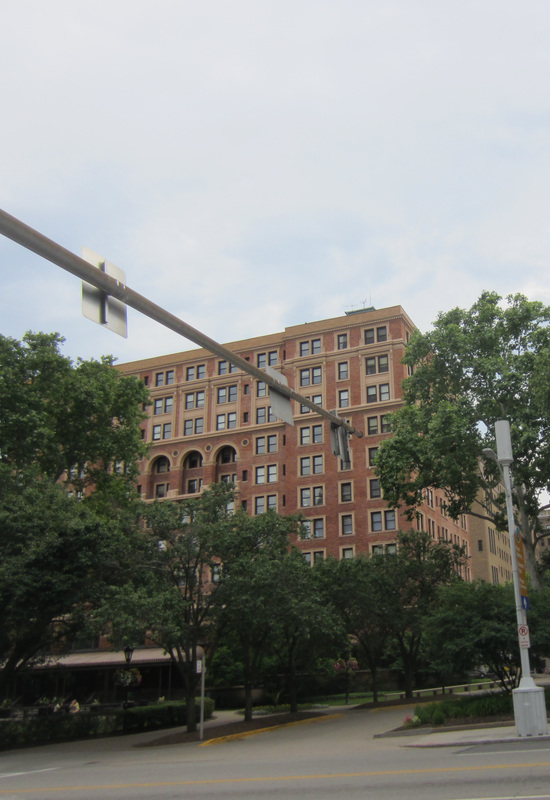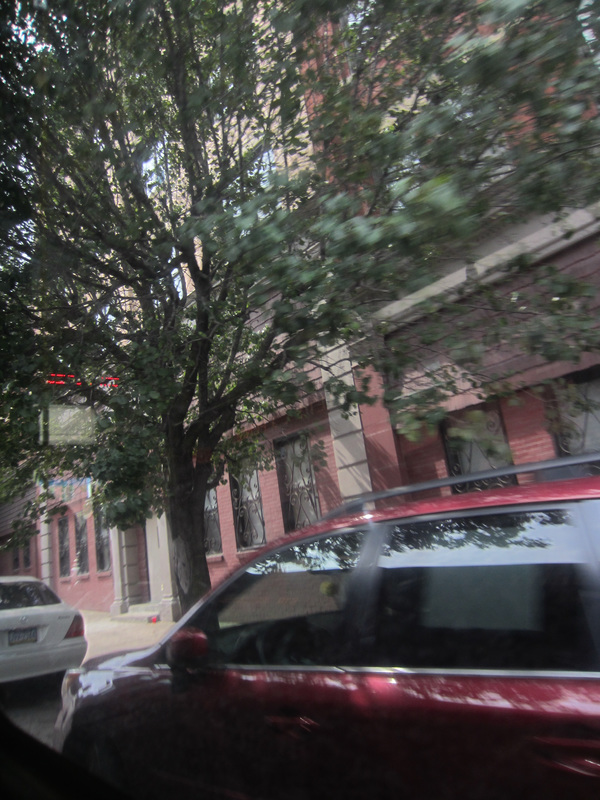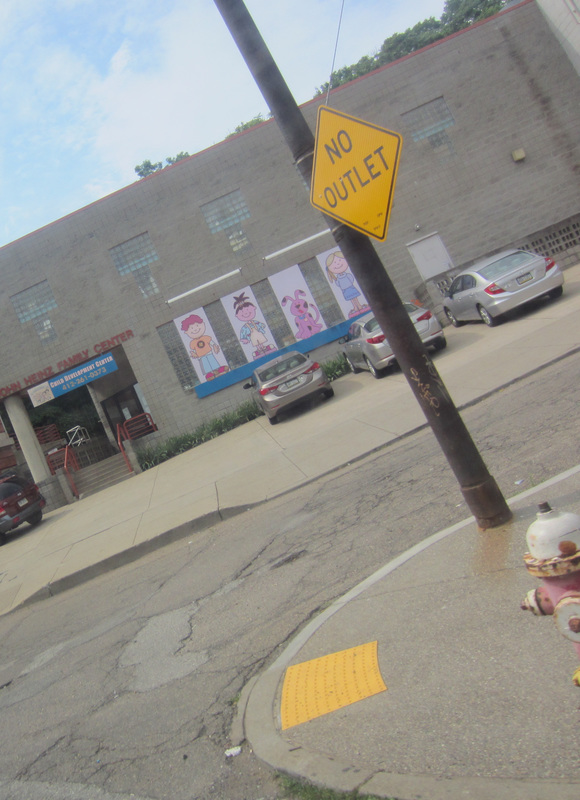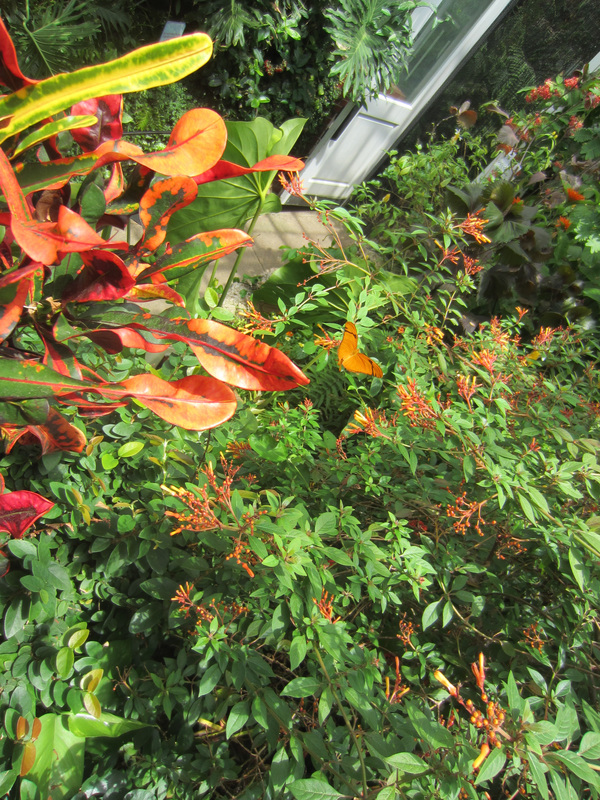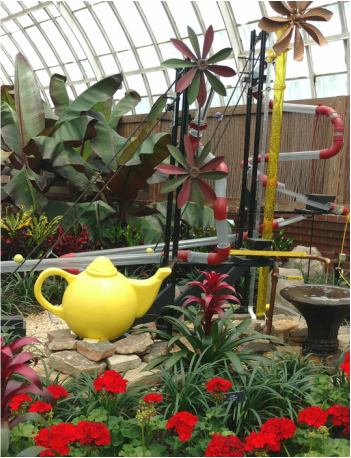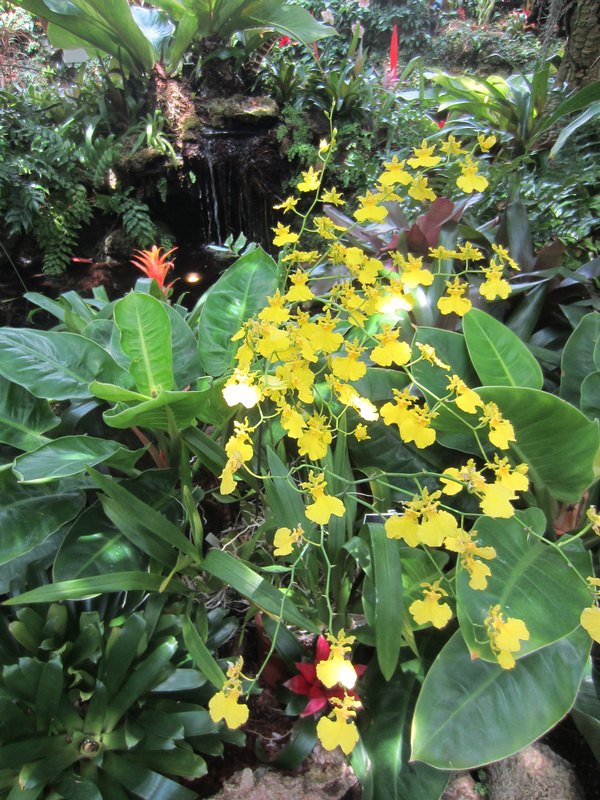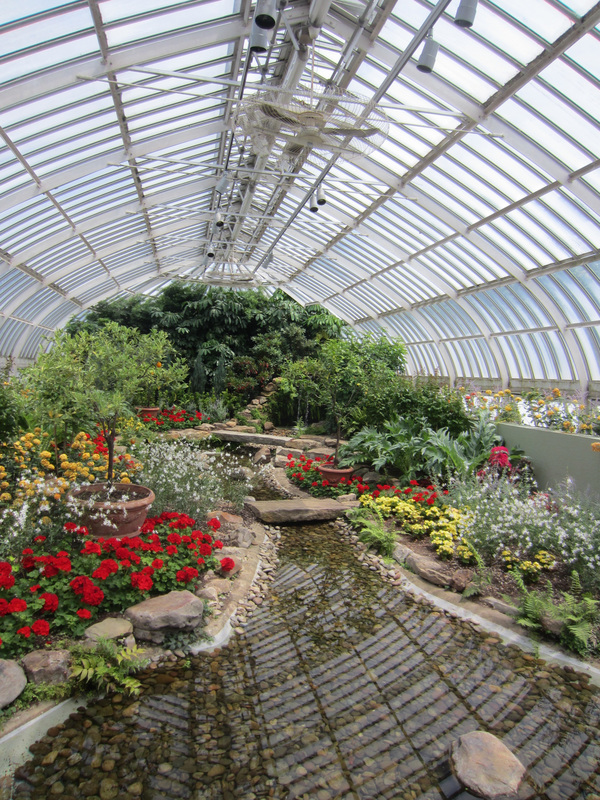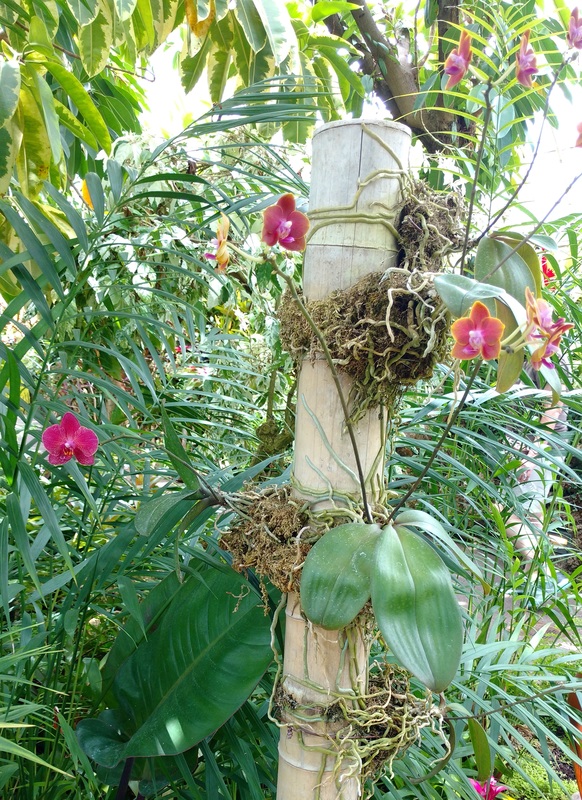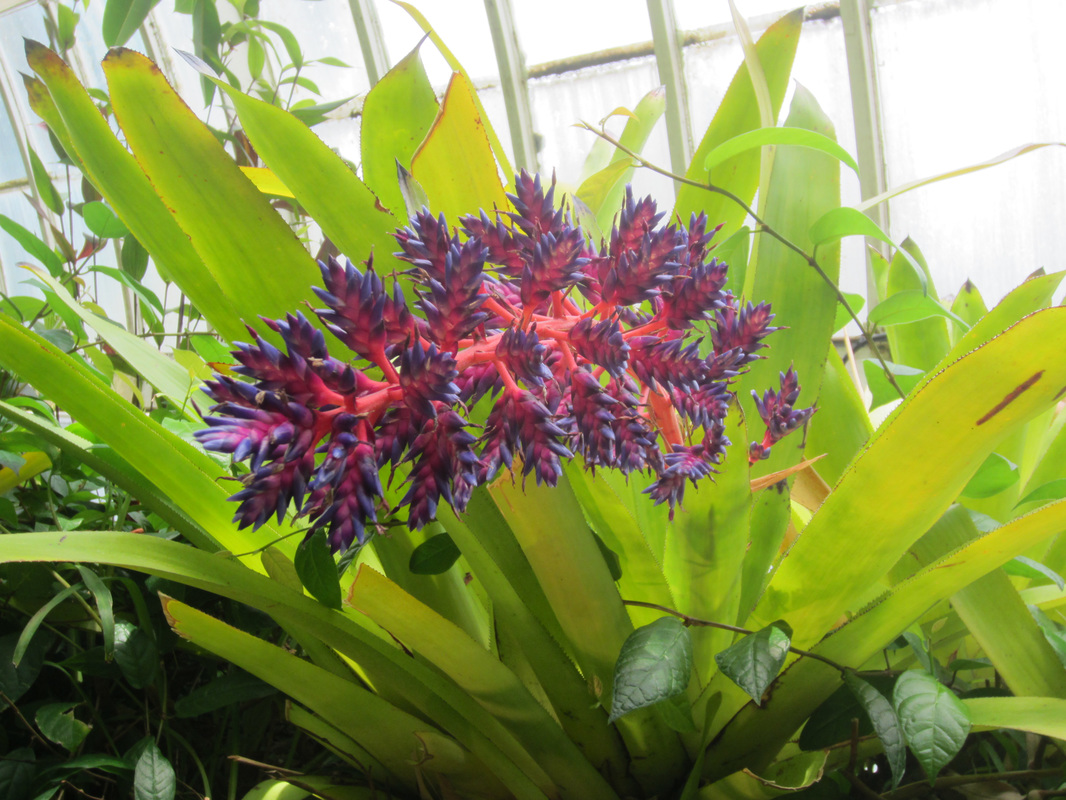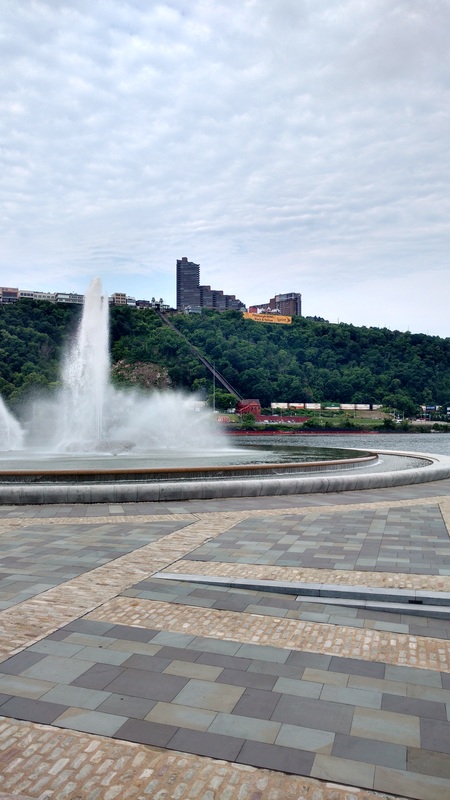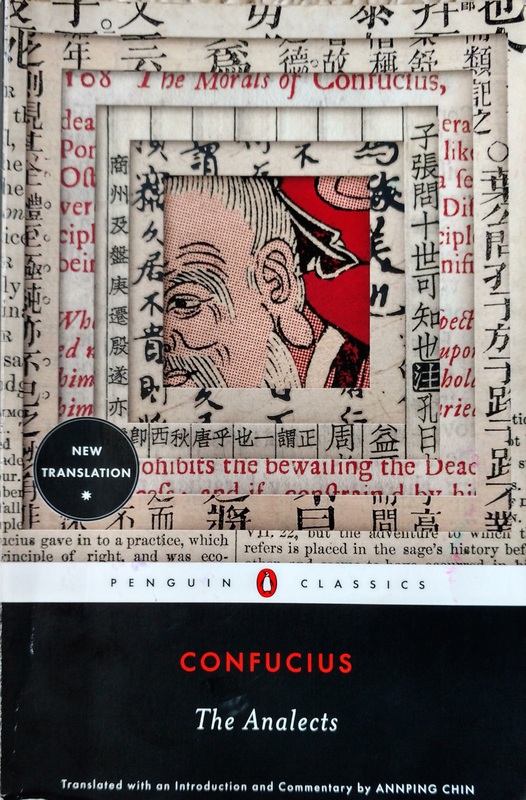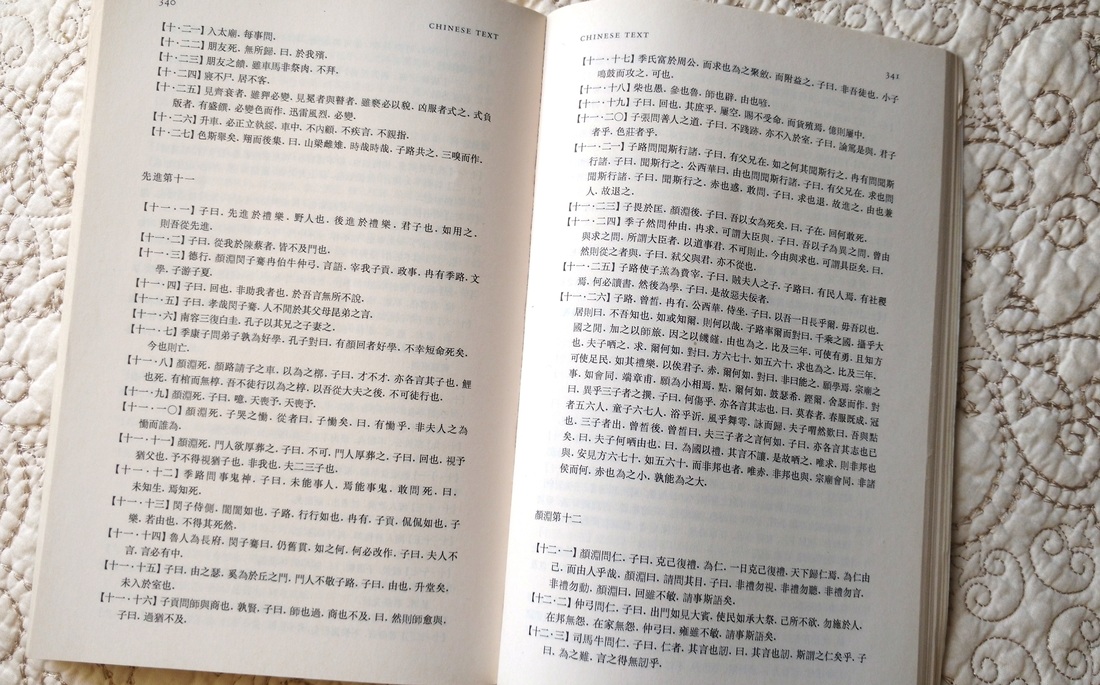|
On my flight I think of the 49 people that were gunned down at a night club in Orlando. I am only just reading the reports that I will continue to pour over. It will be a constant reminder throughout my experience in Pittsburgh. While I won’t be sharing my private thoughts, musings, and angry statements about this tragedy, they were there, interspersed with my sense of the city, clouding my eyes literally and figuratively. En route It is beautiful flying amidst two layers of white clouds with a solid powder-blue slit balancing in the middle. We are flying between two sheets of paper. I can’t see earth at the moment. A powerful experience being separated from the surface that allows me to live, move, and wonder every day. The landing a blessing. Water like mirrors the sky gazes into. The rich, golden land illuminated by the sun that can’t be seen, but shows all. I land grateful that I spent the hesitant money on a flight. Waiting for my sister to arrive, in an airport void of departures for the rest of the night. If an airport could be a ghost town, this is it. Yet I have the company of the night workers, emptying trash, sweeping up bits and crumbs of food, taking supplies back and forth; each set to his or her own task. So focused. Day 1-Good morning Pittsburgh! I already love all your yellow bridges. Simply put, they make me smile. Eating my just-right biscuits and gravy, an ice coffee by my side, as I sit on a stone wall in a patch of sun overlooking the river. I see stadium, hotels, roads, and parking garages past water and bridge. Walking Tour I downloaded a free walking tour from the Robert Morris University website, in preparation for this trip. It teaches me about the competition between Andrew Carnegie and Henry Clay Frick. A strike. The attempted assassination of a man who was anti-labor, but also a major philanthropist in Pittsburgh and other cities, providing art and building. The voice of Mark Houser focuses in on the architecture of downtown, telling me to walk into the gorgeous Union Trust Building, with circles up to the the ceiling. It becomes my favorite, inside and out, brought to us once again by that Frick guy. Appreciating lobbies is not something I would have thought to do, but this tour is full of useful information. Standing in the middle of PPG Plaza surrounded by plate glass, turreted towers inspired by Westminster, and in all the dazzle I almost miss the oldest building in Pittsburgh. A squat stone mansion, small, but proud as on its first day of being. Enjoying a dark chocolate iced latte from Nicholas Coffee Company, housed in yet another ancient stone building. I hand the cashier two fives, she hands me back one of them, “I thought it was $6.48?” Turns out that was the previous order still on the register screen. She laughs. Who would pay that? Explaining in New York that wouldn’t surprise me. She finds this amusing, and so do I. I sip and watch Market Square swirl around me. I walked through this same square without knowing in the early morning and it was practically empty, but with the work day underway and lunch breaks going on this is a place full of human energy. This guide even makes me laugh as he talks about eyeball statues, the Pittsburgh accent and intriguing stories. His love of this city is palpable and I am grateful that such an opportunity is free to anyone that has a smart phone and access to the internet. Duquesne Incline A picture says it all on this lovely ride up Mount Washington, in a creaky old tram.
The Phipps Botanical Garden. So much color and variety, explanation and creative design. I’ve never seen so many interactive elements at a place dedicated to plants, and it is more accessible than any conservatory garden I have experienced. A fountain with buttons to push so that you can control the different water effects yourself. A market of fake fruit and vegetables to learn with. A butterfly room, a wishing well. A fish tank, hut, and masks in a room dedicated to the environment of the Congo. Machines turn out to be an art to boil water or move a train in the most complicated, intricate fashion. An outdoor garden with sprinkler, watering cans, signs saying “water me!,” a mini play house, a fort building area, which would be incomplete without the array of wet, dirty, tired kids who were all tricked into a day of learning that was the most fun. I gape in the orchid room at those delicate creatures. A friendly worker so intoxicated by his work among the gardens, that he has little concept that most people don’t care about the drama of having to move a sprinkler. The two older ladies walk away from him, but I enjoy the simple insider tid bit, into his side of this magical world. To return to my sister in time, I ask the two people at the ticket desk if I need exact change for the bus and how much….they don’t know, they’ve never been asked that question and have never taken the bus. Luckily their manager knows…..yes exact change. $2.50. On the bus back it is mostly students heading into the downtown area or people who get on in the neighborhoods I passed through on my walk. This morning it was an hour walk, now it is a 10 minute drive. Final Morning Sitting in Point State Park to finish my time. Bikers, people walking or running, in the still early morning. The large, circular fountain crashes continuously. Freight trains roll by along one side of one river, with the homes and apartments of Mt. Washington looking on down the incline still running along. The other river hosts the Carnegie Science Center and Heinz field all in red lettering. It is difficult to tell in which direction the rivers run. Amidst periodic sun and dark clouds there is distant thunder. This is a spot that tells so much, hugged from all sides by those signature yellow bridges.
6.20 The Master said, “To know something is not as good as to have a love for it. To have a love for something is not as good as to find joy in it.”
He clarifies what qualities are most important in the individual. 4.1 The Master said, “A neighborhood suffused with a humane spirit [liren] is beautiful. How can a man be considered wise when he has a choice and does not settle on humaneness?” 12.16 The Master said, “A gentleman helps others realize what is good in them. He does not help others to realize what is reprehensible about them. A petty man is just the opposite.” He comments on wealth and poverty, something so central to the history of humankind. He opening voices his admiration for others. (part of) 4.5 The Master said, “Wealth and eminence are what people desire. If you cannot acquire them by proper means, you should not accept them. Poverty and lowly position are what people despise. If you cannot avoid them by proper means, you should not reject them.” 6.11 The Master said, “What an extraordinary man was Hui [Yan Hui]! Living in a shabby neighborhood on a bowlful of millet and a ladleful of water—most people could not have endured such misery, but Hui did not let it take anything away from his joy. What an extraordinary man was Hui!” The way in which Confucius refers to himself was fascinating to read. Did he know how his words would inspire cultures, governments, individuals, thousands of years after his death? He can be guarded, but in the moments he reveals himself it is striking, and I for one couldn’t help but feel a great deal of affection for the speaker. 5.26 Zilu said, “We would like to hear what you would like to see yourself accomplish.” The Master said, “To give comfort to the old, to have the trust of my friends, and to have the young seeking to be near me [huaizhi].” 7.19 The Governor of She asked Zilu about Confucius, and Zilu gave no answer. The Master later said to Zilu, “Why didn’t you simply say that he is the sort of person who forgets to eat when pursuing a question, who forgets to worry when suffused with joy, and who does not note that old age is coming?” He is demanding when it comes to being a leader. Giving recommendations so many could learn from.
13.13 The Master said, “If you know to correct yourself, what difficulty will you have should you decide to serve in government? If you do not know to correct yourself, how can you hope to correct others?” 2.13 Zigong asked about the gentleman [junzi]. The Master said, “He first puts his words into action. He then lets his words follow his action.” He observes about life and death. 11.2 Jilu [Zilu] asked about how to serve the spirits of the dead and the gods. The Master said, “You can’t even serve men properly, how can you serve the spirits?” “May I then ask about death?” “You can’t understand life, how can you understand death?” The Analects gave me new ways of looking at the world around me, and defined things I did not know were already a part of my life. These did not feel like orders or requirements, but helpful suggestions. I can imagine that each reader would be touched by different passages at different times in life. Some things were beyond my comprehension, others rung true for the present. And every once and awhile a phrase would grab me and never let go of its mystery. 9.28 The Master said, “Only in the deepest winter do we realize that the pine and cypress are the last to shed their leaves.” For more information on this series of posts focused on the reading of different religious texts see my original post Reading Religion Part I: The Quran. |
SAMANTHA KEOGHMultidisciplinary Artist Archives
April 2020
|

